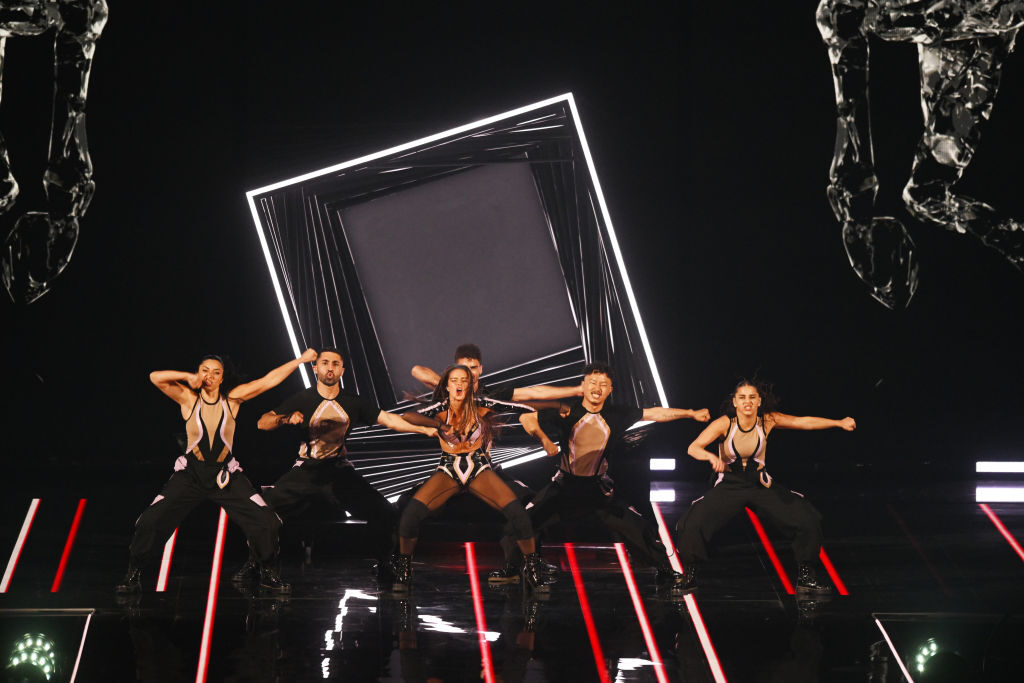
Israeli public broadcaster Kan confirmed on Sunday it would ask songwriters to rewrite submissions in consideration to represent the country at the Eurovision Song Contest after reports indicated that the contest would reject a song with references to the Hamas October 7 slaughter because it was too “political.”
The Eurovision Song Contest is an annual competition in which European countries and some non-European participants, such as Israel and Australia, send a musical artist to perform an original song. A combination of elite judges and public voting are used to determine the best song, whose country hosts the next year’s event. The 2023 winner – in a controversial ruling in which Finland won the popular vote but failed to convince the experts – Sweden will host the 2024 competition.
As a post-World War II institution, Eurovision aggressively imposes bans on perceived “political” content.
“The ESC is a non-political event,” the official contest rules read. “All Participating Broadcasters, including the Host Broadcaster, shall be responsible … to make sure that the ESC shall in no case be politicized and/or instrumentalized and/or otherwise brought into disrepute in any way.”
Israel has not formally submitted an entry but chose singer Eden Golan to represent the country. The outlet Israel Hayom reported in February that organizers had chosen the song “October Rain” for her, which had lyrics overtly honoring the families killed by Hamas on October 7.
According to reports, the song concluded with the lyrics “they were all good children, each one of them,” a reference to the hundreds of children, some as young as infants, brutally murdered by Hamas jihadists on that day.
Other lyrics as reported by Israel Hayom included, “Evening/Everything is black and white/Who is the fool/ Who told you boys don’t cry/Hours and hours/ and flowers/Life is not a game for the cowards…/While time goes by/Every day/I’m losing my mind/Holding on.”
The Times of Israel reported that Kan had previously insisted it would not rewrite any lyrics submitted to the song contest, but issued a statement on Sunday confirming that it had asked the writers of “October Rain” and another finalist entry, “Dance Forever,” to rewrite the songs “with full artistic freedom.” The result of that process is reportedly a song called “Hurricane” which uses the same music of “October Rain” but is about a “young woman surviving a personal crisis,” rather than about terrorism victims. Kan added that the nation would not officially reveal the 2024 entry until Sunday, March 10.
The Kan statement credited Israeli President Issac Herzog with arguing for a rework that would guarantee Israel was represented on the Eurovision stage.
“Particularly at a time when those who hate us are trying to push us out and boycott the State of Israel on every stage, Israel must have its voice heard with its head raised high and fly its flag in every global forum, particularly this year,” Herzog had reportedly argued.
Sweden, as a host, is facing significant pressure not to allow Israel to participate in the contest from pro-Hamas elements, who claim that Israel’s self-defense operations in Gaza to ensure that the terrorists cannot repeat the horrors of October 7 merit ostracizing Israel from the civilized world. In early February, a group of over 1,000 Swedish music artists and members of the industry signed a letter demanding Eurovision banish Israel from the contest, including prominent Swedish artists such as Robyn and members of the electro duo The Knife.
“We believe that by allowing Israel’s participation, the EBU is demonstrating a remarkable double standard that undermines its credibility,” the letter, published by the Swedish newspaper Aftonbladet, read. “Allowing Israel to participate undermines not only the spirit of the contest but the entire public service mission. It also sends the signal that governments can commit war crimes without consequences.”

File/ Israel Entry Noa Kirel performs “Unicorn” on stage during The Eurovision Song Contest 2023 Grand Final at M&S Bank Arena on May 13, 2023 in Liverpool, England. (Photo by Anthony Devlin/Getty Images)
Organizers of Eurovision have struggled to consistently enforce their ban on political content. In 2016, for example, Ukraine won the contest with a song about Josef Stalin’s ethnic cleansing of Crimean Tatars, expelled from the Crimean peninsula now once again under Russian control. The lyrics included over references to the clearly political event, including, “when strangers are coming, they come to your house, they kill you all and say, ‘we’re not guilty, not guilty.’”
That year’s contest, also hosted by Sweden, was advertised as promoting a “refugee crisis” theme.
“It is more necessary than ever before that we unite and join together, and that is literally what we do in Eurovision, where most of the countries in Europe meet together,” Swedish 2015 Eurovision winner Måns Zelmerlöw said. “We obviously want to touch upon it: anything else would be to bury your head in the sand.”
The Eurovision Song Contest banned Russia from participating in 2022 in response to the government’s decision to invade another Eurovision competitor, Ukraine. While Eurovision organizers claim the event is strictly non-political, the European Broadcasting Union (EBU), which oversees the event, explained that the ban “reflect[ed] concern that, in light of the unprecedented crisis in Ukraine, the inclusion of a Russian entry in this year’s contest would bring the competition into disrepute.” Ukraine won the 2022 contest but could not host due to the war, so Liverpool, England, stepped in as a replacement.
In an attempt to adhere to the “no politics” rule, Eurovision reportedly rejected a request by Ukrainian President Volodymyr Zelensky to address the event in 2023.
Follow Frances Martel on Facebook and Twitter.
